Ramentor is one of the educators in World Class Maintenance training program

With the acquisition of Ramentor, AFRY further strengthens its digitalization capabilities and advances RAMS offering for clients. By using RAMS, AFRY can help clients make more informed decisions, optimize their risk level and overall life-cycle costs and support them in their digital transformation to more sustainable and cost-efficient solutions.
- RAMS engineering and consulting services are foreseen to be increasing in the coming years and are a key part of our energy and industry markets transition strategy. By integrating RAMS to current industry technical design practices we will create a unique differentiator for our services, says Richard Pinnock, Head of Division Energy, AFRY.
- We are excited to be part of AFRY. We have two decades of solid R&D and pragmatic industry project history on dependability management, and the market is clearly maturing now along with digitalization. Together with AFRY we can take our services to the next level by adding a significant global client base and support in future engineering and digitalization, says Timo Lehtinen, Managing Director of Ramentor.
Get to know Ramentor's products, trainings, application services and customer cases.
Afry Newsroom: https://afry.com/en/newsroom/press-releases/afry-acquires-software-and-expertise-company-ramentor-in-finland

Ramentor Oy is one of the company partners in the SMARAGDI consortium, which aim is to develop intelligent solutions for future high-temperature superconducting (HTS) magnets. The public-private consortium advances magnet technology and updates an experimental facility for testing HTS magnets in Tampere, Finland.
Ramentor's research focuses on reliability modelling of magnet manufacturing process and design of condition monitoring. The aim is to develop powerful analysis approaches that are applicable also to various other industry sectors. For complex systems, the combination of advanced modelling solutions and automatized data collection is required to enable calculation of useful analysis results without excessive workload.
"At Ramentor, we are developing modeling tools to analyze the condition monitoring needs in challenging systems. Fast data analysis can improve the machine reliability and increase its efficiency. Ramentor will support the TAU research in condition monitoring,” explains managing director Timo Lehtinen.
Business Finland has granted 1.2 M€ to the SMARAGDI consortium. The total value for the 2-year joint effort of Tampere University (TAU), 3DStep, Teraloop, Ramentor, Meluta, and Luvata is 2 M€. The long-term goal is to put Finland at the forefront of HTS magnet development when the technology fully breaks through to commercial applications.
More information can be found from the project website: https://projects.tuni.fi/smaragdi/
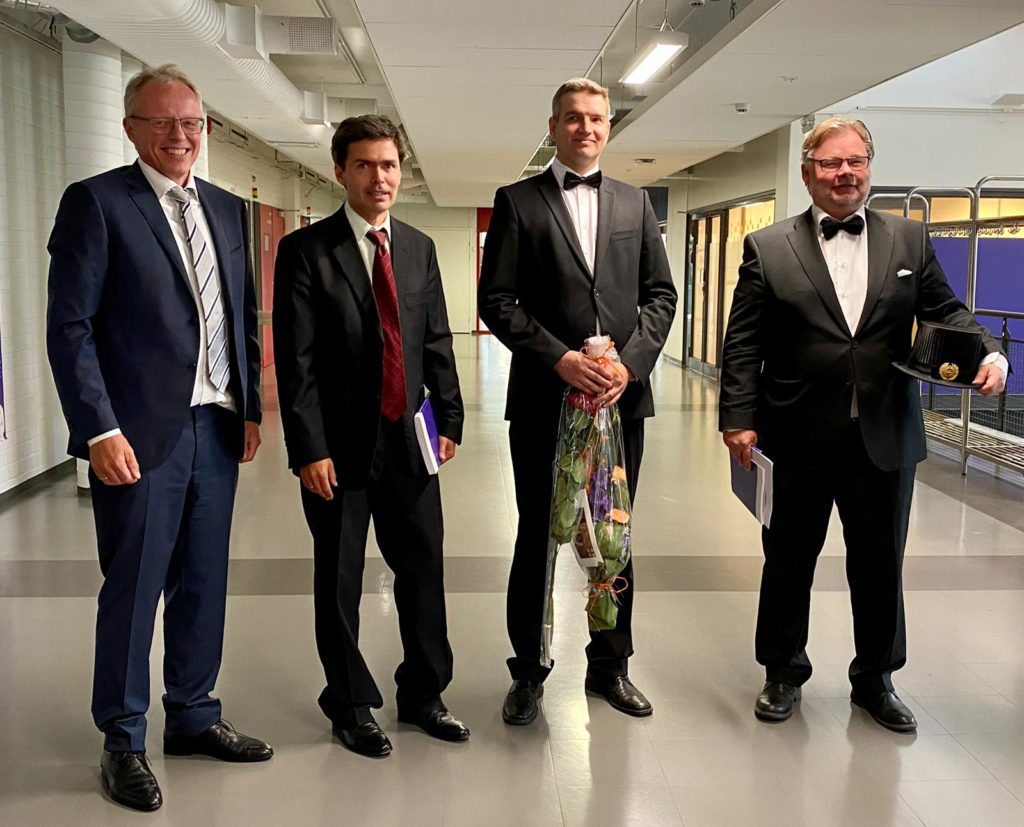
The Large Hadron Collider (LHC) in European Organization for Nuclear Research (CERN) is one of the most challenging targets in the world for reliability analysis. Only by using an efficient and flexible modelling technique it is possible to understand all the details affecting the operation. The same powerful approach can be used for increasing the production and energy efficiency of industrial processes.
As a part of the Future Circular Collider (FCC) study, CERN, Tampere University and Ramentor Oy developed a novel reliability modelling approach that is suitable especially for vast and complex analysis targets. The research focused on enabling automatized model creation and on ensuring diverse applicability and sufficient calculation speed. The result of the research was an OpenMARS approach, which was published in a peer-reviewed article.
In his doctoral dissertation M.Sc. (Tech.) Jussi-Pekka Penttinen has developed the OpenMARS approach further to act as a framework for customized reliability, availability and risk analysis tools. The framework supports fast and efficient development of a tool that adapts to the domain-specific needs of the analysis target, automatizes the model creation, and optimizes the calculation speed of analysis results. When compared to traditional tools, the use of a customized tool is significantly more user-friendly and the workload of the analyses can be managed better.
The dissertation is available online at:
http://urn.fi/URN:ISBN:978-952-03-1635-8
Väitöstiedote suomeksi:
https://www.tuni.fi/fi/ajankohtaista/uusi-kayttovarmuuden-mallinnustapa-mukautuu-analysointikohteiden-erityistarpeisiin
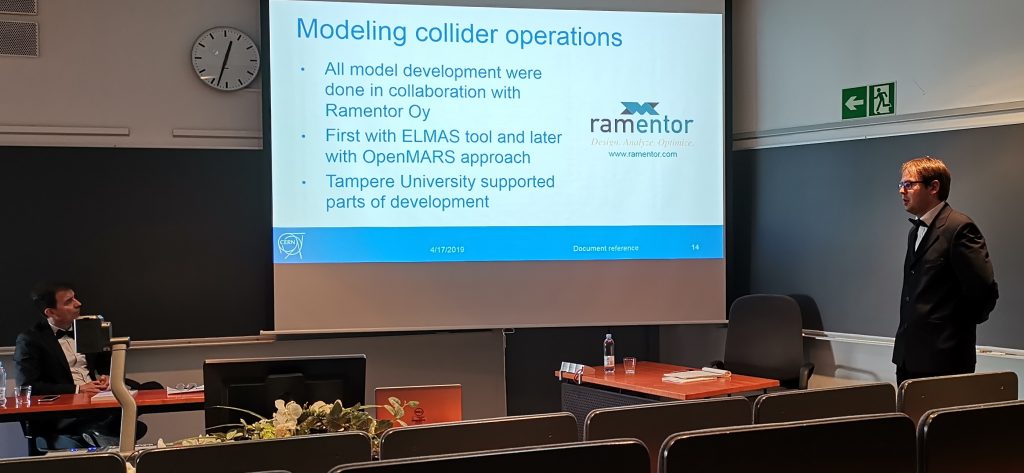
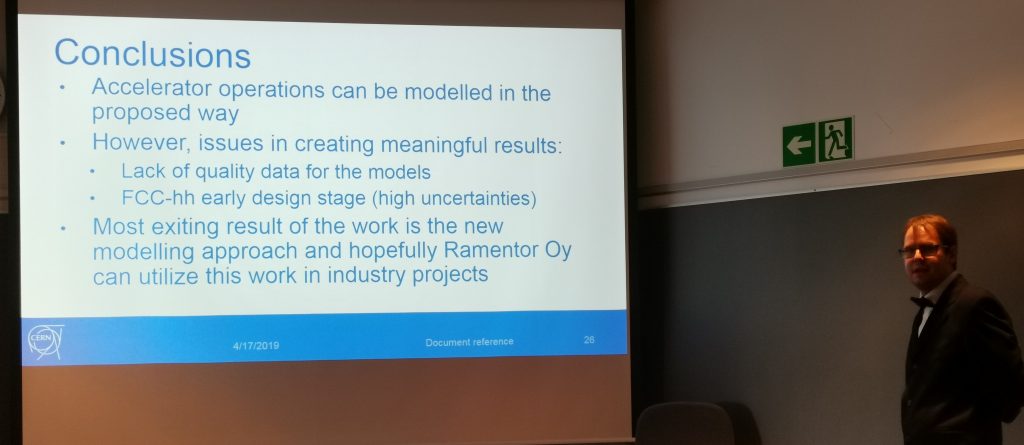
In 2014 Ramentor started a co-operation with Tampere University and CERN to research methods and tools for reliability and risk assessment of particle colliders. The research is a part of Future Circular Collider (FCC) study, which develops scenarios for post-Large Hadron Collider (LHC) era. ELMAS was selected as a tool for model the collider systems and to simulate the particle acceleration process. The model enables assessing availability and collision production, which are essential quality attributes of a particle collider.
An ELMAS model of CERN's particle collider was created by M.Sc. (Tech.) Arto Niemi. In his doctoral dissertation “Modeling Future Hadron Colliders’ Availability for Physics” he validates the model against LHC operations and shows preliminary results on the FCC availability and collision production.
Mr Niemi's work for creating the particle accelerator's ELMAS model formed a foundation for a R&D agreement between CERN and Ramentor. The target was to develop an approach that allows combining the most common risk assessment and operation modeling techniques for efficient analysis of complex system with dynamic operation changes. In 2017 the FCC Innovation Award was given to the research. In 2019 Ramentor, Tampere University and CERN published the developed OpenMARS approach in a peer-reviewed article.
The dissertation is available online at http://urn.fi/URN:ISBN:978-952-03-1057-8
ELMAS version 4.9 has been released. Since the previous version ELMAS 4.8, following new features have been included in the software:
- A fast way to install ELMAS directly by extracting a zip-arhive for example to desktop
- A new launcher tool that improves the support of different Java versions
- Optimized edit of very large (10 000 nodes) models
- Columns "Used in active tab" and "Nodes in analysis" available in nodes list popup menu "Select data fields...."
- Possibility to edit investment costs and other risks for nodes
- Possibility to define default probability gate selections from Options -> Nodes -> Ports
- Possibility to import a three structure from categories defined in Excel
- Definition of dynamic effects and conditions, such as a rule when a repair is start is allowed
- A shortcut for a three state (failure-wait-repair) simulation
- Improved analysis results and summary tools
The full list of all changes can be found from below (unfortunately only in Finnish).
- Asennus ja käyttö
- Lisätty zip-paketista purettava ELMAS asennus normaalin asennuspaketin rinnalle. Zip-pakettia käyttämällä käyttäjä voi helposti ottaa käyttöön uusimman ohjelmaversion ilman pääkäyttäoikeuksia vaativaa asennusta.
- Otettu käyttöön uusi Ramentor-launcher. Tämä käynnistysohjelma toimii kaikkien Ramentor työkalujen käynnistämiseen ja mahdollistaa Java:n muistiasetusten valitsemisen käyttöliittymästä ja monen rinnakkaisen työkaluversion rinnakkain käyttämisen (käytetty versio valitaan käynnistettäessä).
- Optimoitu "Lisää uusi portti lapseksi" operaatio toimimaan yli 10k puilla
- Optimoitu "Irrota alipuu" operaatio toimimaan yli 10k puilla
- Optimoitu "Poista alipuu" operaatio toimimaan yli 10k puilla
- Solmujen lista
- Solmujen listalle voi nyt lisätä sarakkeet "Used in active tab", ja "Nodes in analysis". Sarakkeet saa näkyviin valitsemalla solmujen listan popup-valikosta "Select data fields....". "Nodes in analysis" valinta näyttää ne solmut mitkä ovat mukana laskennassa. Se siis jättää juuriporttien alapuolelle jääneet solmut pois ja käyttäjä voi näin selvittää mitkä ovat välilehden todelliset juurisolmut.
- Editori
- Lisätty uusi "Muut riskit" laji "Investoinnit"
- Lisätty tuki määritellä todennäköisyysporteille ELMAS-asetuksissa (Options->Nodes->Ports) oletusseurausvaihtoehtoja. Määriteltyjen vaihtoehtojen mukaan määräytyy seuraustodennäköisyyden nimi ja todennäköisyyden oletusarvo. Luotujen seurausvaihtoehtojen järjestys määrää mikä näistä vaihtoehdoista määrätään kullekin ehtoportin seurausvaihtoehdolle. Määriteltyjä seurausvaihtoehtoja voidaan määrittelyn jälkeen valita näkyviin taulukkoyhteenvetoon valitsemalla haluttu vaihtoehto valinnoista. Seurausvaihtoehdot voidaan myös määritellä näkyviin Excel-vientiin ja HTML-raporttiin.
- Excel tuonti
- Lisätty mahdollisuus tuoda kategoriarakenne suoraan malliksi. Tämä toiminto luo tuotavasta datasta mallin ja lisää luodun mallin root tasolle datan täsmälliset vikaantumisajat, korjausajat ja kustannukset. Valitut kategoriat määritellään asetusten sivulla (Asetukset -> Solmut -> Kategoriat). Tuonnissa voidaan määritellä mitkä ovat datarivin kategorian määrittelevät sarakkeet ja mitkä ovat mahdollisesti kategoriaa kuvaavia tekstisarakkeita.
- Excel-tuonti osaa nyt tuoda oikein pudotusvalikoissa esiintyvää dataa. Data voidaan tuoda muodossa valintavaihtoehdon merkkijono tai valinnan indeksi
- Parannettu Excel-tuonnin toimintaa laskentakaavojen kanssa
- Simulointi
- Lisätty mahdollisuus asettaa tehtävien aloitus säännöt solmulle. Säännöt asetetaan kunkin tehtävän dynaamisten vaikutusten välilehdeltä (Asetukset -> Tehtävät -> Korjaus -> Näytä dynaamiset vaikutukset)
- Lisätty mahdollisuus määritellä ehtoja tehtävien vikamuodoille aiheuttamiin muutoksiin. vikamuotojen ehtoihin voi määritellä useita solmuja and tai or logiikkaa ehtojen välille.
- Siirretty tehtävän seuraava tila valinta editorin dynaamisten pikavalintojen välilehdeltä kunkin työtehtävän dynaamiselle välilehdelle.
- Lisätty mahdollisuus määritellä solmun aloitustila editorista (Dynamic->Shortcuts)
- Lisätty ehtoporttiin valinta että ehtoportti nollautuu vasta kun kaikki portin alla olevat juurisolmut ovat OK tilassa. (Relations -> Ehtoportti (Viive/Kesto): Odota alipuun korjaukset)
- Lisätty uusi "Vika-Odotus-Korjaus simulointi" -työkalu. Työkalu on tehty normaalin "Simulointi: Perus" -työkalun pohjalta sillä erolla, että vika-tapahtuman jälkeen tulee aina odotus-tapahtuma, jonka jälkeen vasta tulee korjaus-tapahtuma.
- Analysointi
- Lisätty luokittelun "Analysointi Solmu" ja "Analysointi Kombinaatio" välilehdille uudet analysointitekijät: "Analysointi: Period(d)" ja "Analysointi: Period(a)". Näiden avulla voi käyttäjä tehdä luokitteluun laskentakaavoja, kuten MTBF (period/count).
- Lisätty luokitteluun mahdollisuus määritellä sanallisesti arvo-alueita. Esimerkiksi mikäli lausekkeen tulos on välillä -1 ja 1 niin tuloksena näytetään "OK", mikäli tulos on välillä 1 ja 10 niin tuloksena näytetään "KOHONNUT RISKI", jos tulos on välillä 10 ja ääretön niin tuloksena näytetään "VAARA".
- Lisätty mahdollisuus määritellä editorin linja sivulla minimi tuotantoprofiili jolla riskiä ei tule (Editor -> Linja -> Tuotantoprofiili -> Suorituskykytarve määräytyy tuotantoprofiilin perusteella). Eli jos portille on määritelty minimituotantoprofiili millä riskiä ei tule ja portin alla oleva lapsi menee vikatilaan, niin tarkistetaan onko lapsen vähentämä tuotanto pienempi kuin minimituotanto ja jos on, niin riskiä ei toteudu.
- Lisätty mahdollisuus analysoida tuotua kategoriarakennetta solmujen katagoriatietojen perusteella (Analysointi -> Kooste -> Kategoriat). Kategoriadatan analysoinnissa on mahdollista määritellä yksittäiset laskennassa mukana olevat kategoria-arvot. Esimerkiksi laitepaikan 10 kaikki vikakoodit. Kategoriadatan laskentatulokset voidaan viedä Excel-dokumenttiin.
- Lisätty kaikkiin analysoinnin taulukkoihin toiminto, millä voi nopeasti laskea valitun alueen summan ja keskiarvon. Toimintoa voidaan käyttää niin että valitaan haluttu alue ja avataan taulukon popup-valikko hiiren oikealla napilla.
- Lisätty analysointituloksiin suunnittelujakson vikalukumäärän mediaanikäyrä
- Yhteenvetotyökalut
- Parannettu Yhteenveto seuraukset -taulukon layouttia niin että tyhjiä rivejä ei enää tehdä ja samalla id:llä olevat solmut, jotka liittyvät tarkasteltavaan root solmuun, yhdistetään yhdeksi.
- Lisätty mahdollisuus suodattaa sarakkeita taulukkoyhteenvedossa combobokseissa näkyvän tekstin mukaan (aikaisemmin etsintä rajoittui comboboxien kohdalla niissä valittuun indeksiin). Tämä mahdollistaa sen että käyttäjä voi nyt suodattaa helposti pois kaikki solmut jotka eivät ole tyyppiä Todennäköisyysportti (sopiva filtteri esim. "Tod*").
- Lisätty toiminnallisuus järjestää taulukkoyhteenvedossa simuloinnin tulokset niin että ne järjestyvät oman yksikön mukaan.
- Our new improved site ramentor.com presents our main offering:
- With our ELMAS software you can model and analyze RAMS and risks
- Our RAMS trainings helps you to select and apply efficient methods for improving reliability and managing risk
- With our solutions & services you can apply sophisticated methods for cost-efficient risk management
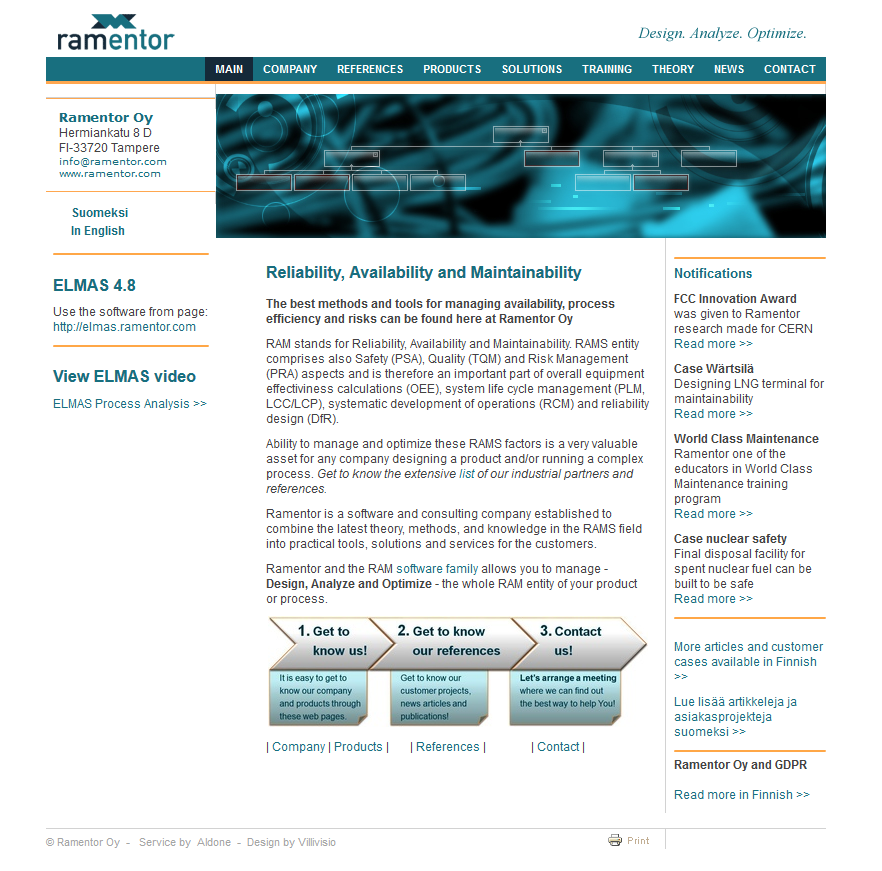
Our old site until 14.12.2018 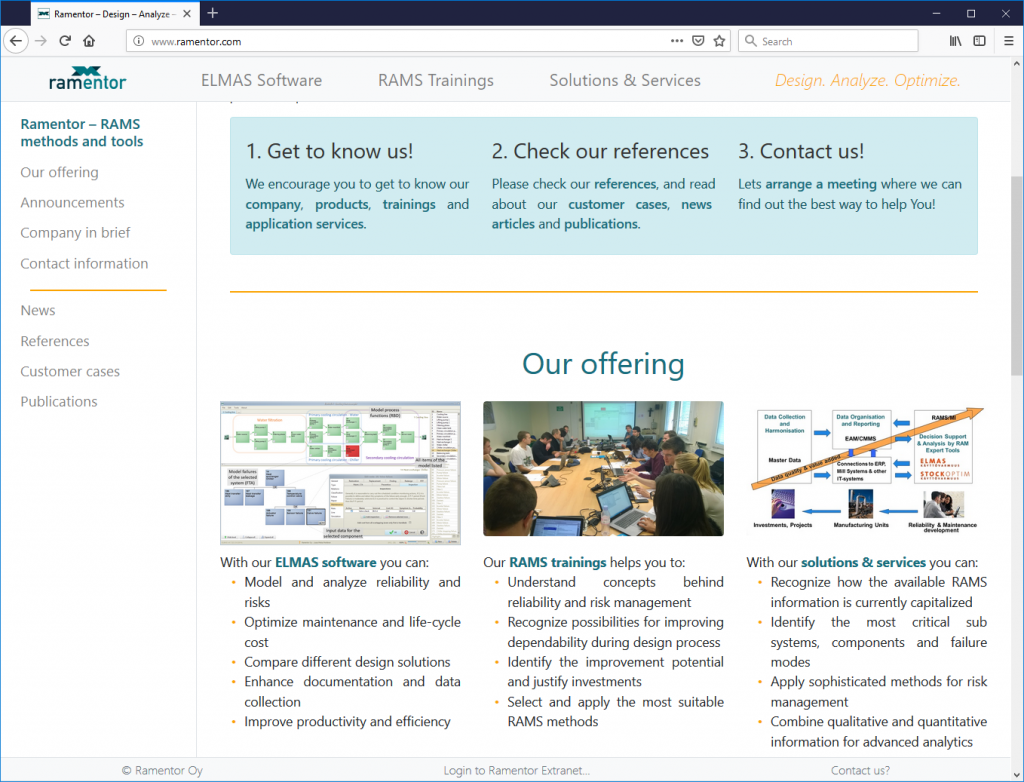
Our new site from 14.12.2018
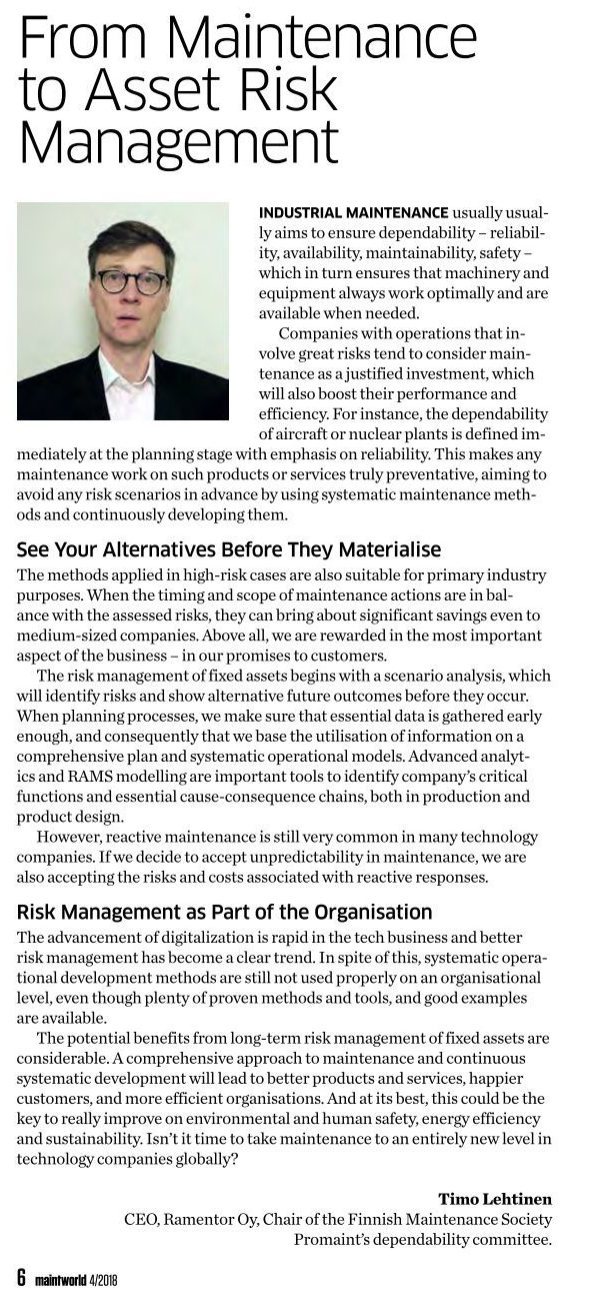
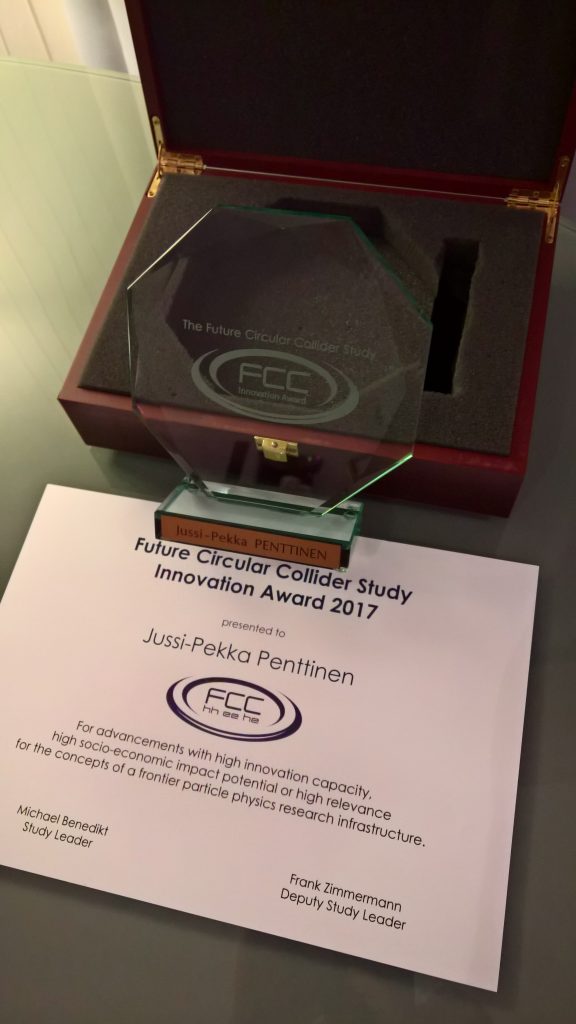
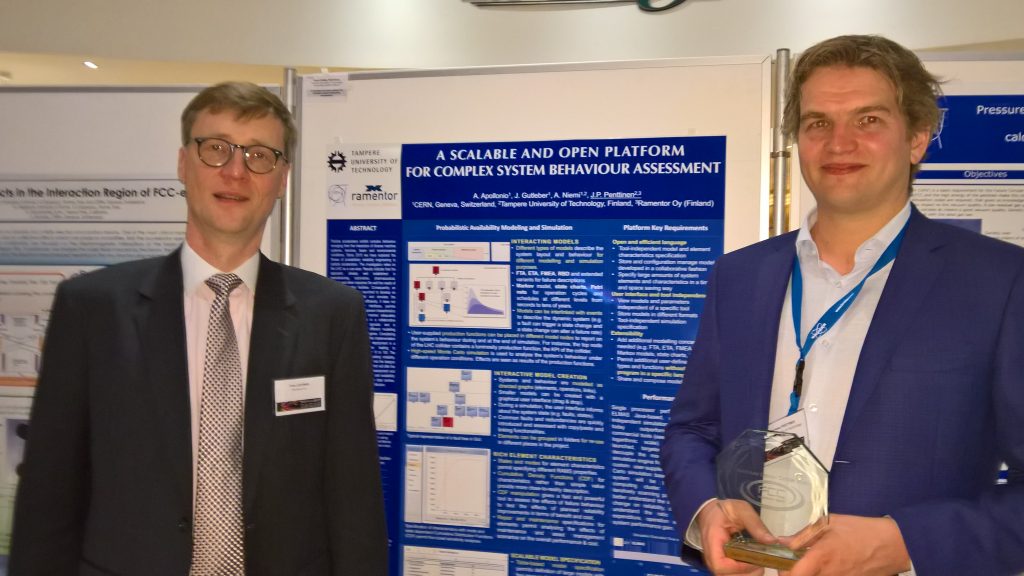
CERN Future Circular Collider Study (FCC) had 3rd annual meeting between May 29 and June 2 in Berlin. During the FCC Week 2017 the FCC Study Innovation Awards were given to celebrate and honor the most exciting tech and scientific developments in the FCC collaboration. The year 2017 award was given to Jussi-Pekka Penttinen, who is a doctoral student in Tampere University of Technology and works also as a chief architect of the ELMAS software in Ramentor. The award goes for the design work on an open and scalable modelling and simulation platform to understand and optimize the reliability, availability and energy efficiency properties of the particle accelerator complex.
The work is not only essential for the design of a future collider, but it efficiently leverages the existing infrastructure at CERN and can also find many applications in the industry. A large internationally active energy supply company got interested in the work on FCC to apply the method and tool for design work of a new type of liquefied natural gas (LNG) terminal. Also, for example, reliability of paper machine components, availability of data center infrastructure, and failure tolerance of final disposal facility for spent nuclear fuel have already been analyzed with the approach.

The upcoming digitalization puts more and more emphasis to Industrial Internet of Things (IIoT), which brings both opportunities and challenges for the management of business services and maintenance functions. These opportunities and challenges are discussed by experts from different Finnish industrial companies in a new book published by Finnish Maintenance Society, Promaint.
The upcoming digitalization puts more and more emphasis to Industrial Internet of Things (IIoT), which brings both opportunities and challenges for the management of business services and maintenance functions. These opportunities and challenges are discussed by experts from different Finnish industrial companies in a new book published by Finnish Maintenance Society, Promaint.
Ramentor acts as one of the expert groups representing various technical solutions for IoT management. A book chapter that is provided by Ramentor explains through practical examples how IoT deployment can be executed as effectively as possible in cases where the previously collected data in the organization has inadequate quality.
The book is available unfortunately only in Finnish. It can be bought from: http://promaint.mycashflow.fi/product/10/teollinen-internet-uudistaa-palveluliiketoimintaa-ja-kunnossapitoa
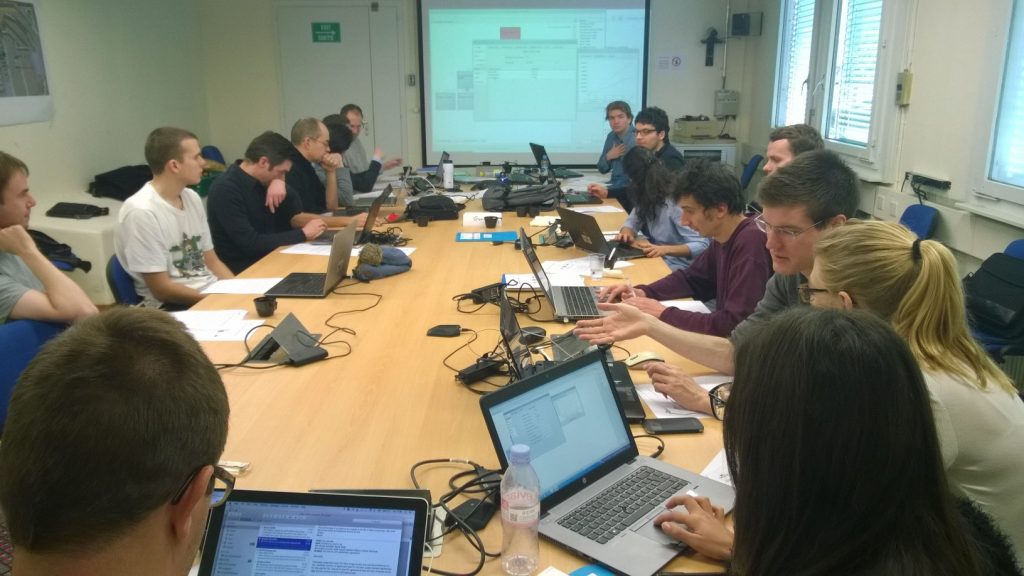
World Class Maintenance training program, organized by AEL, is an advanced three-month education for supervisors, designers and managers working in the Finnish maintenance sector. The purpose of the training program is to coach Finnish maintenance experts to use certified and the most efficient maintenance management techniques in their work.
Ramentor's role in the training program is to provide material for the education and to act as one of the training program educators. The program includes many Ramentor's expertise-specific topics like different risk management methods and analysis tools used for RAMS management and development.
Ramentor offers also customer-specific RAMS trainings for everyone looking to increase their knowledge on RAM and its management. These customized trainings can include e.g. basics of RAMS or more advanced know-how on RAMS development and different analysis tools (e.g. FMEA, RCM, FTA and RBD) used for it.
One great example of a customized RAMS training is the package created for CERN.